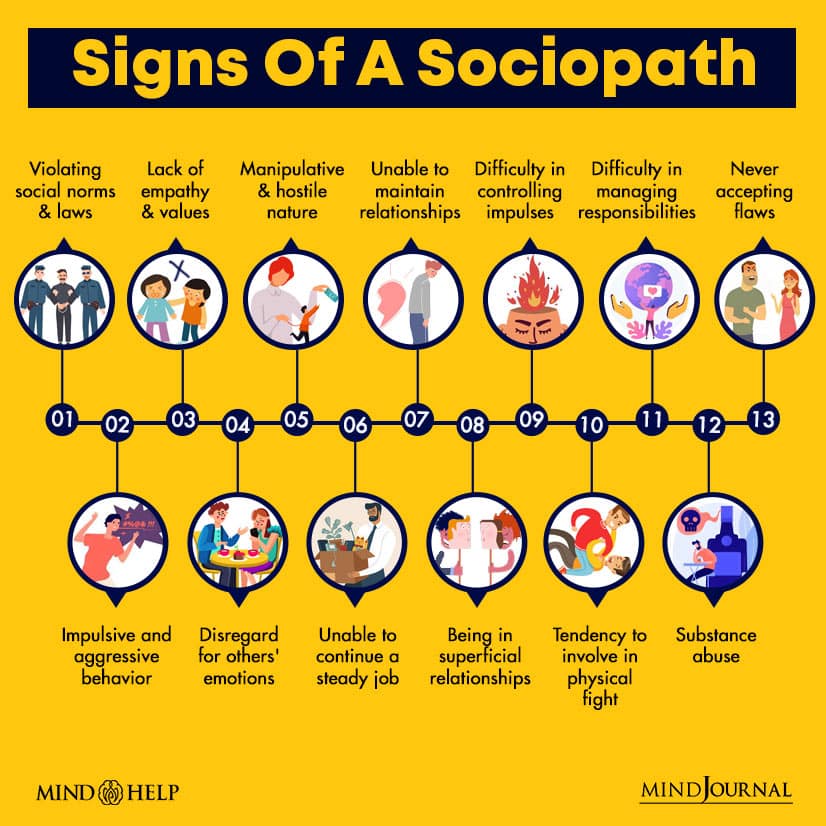When we toss around the terms “sociopath” and “narcissist,” it’s usually to describe a villain in a movie or that one ex we’d rather forget. But in reality, these are complex personality disorders that go beyond just being the bad guy, which is why it’s vital to understand the differences between sociopathy vs narcissism.
Sociopaths and narcissists can be charming, intelligent, and the life of the party, which makes it tricky to spot the deeper issues. While they share some overlapping traits, like a disregard for others’ feelings, there are key differences that set them apart.
Let’s unravel these distinctions without undermining the serious nature of these disorders. However, before we delve into sociopathy vs narcissism, let’s first talk about the traits of a sociopath and the traits of a narcissist.
Related: 8 Signs You Are In A Relationship With A Narcopath (Narcissist-Sociopath Mix)
Traits Of A Sociopath
- Lack of empathy: An inability to feel or understand the emotions of others.
- Deceitfulness: Frequent lying or use of aliases for personal gain or pleasure.
- Manipulative behaviour: Using charm or wit to exploit others for personal gain.
- Impulsivity: Difficulty in planning ahead and tendencies to act on the spur of the moment without considering consequences.
- Aggressiveness: A propensity for violence or aggressive behaviour when provoked.
- Irresponsibility: A lack of regard for financial or social obligations.
- Lack of remorse: Indifference or rationalization of having hurt, mistreated, or stolen from another person.
- Risk-taking behaviours: A proclivity for engaging in dangerous activities without considering the risks for oneself or others.
- Superficial charm: A captivating presence that can be enticing but is often shallow.
- Poor behavioural controls: Displays of irritability and annoyance, or acting rashly and angrily, with little provocation.

Traits Of A Narcissist
- Grandiosity: An inflated belief of one’s own significance and superiority.
- Fantasy: Preoccupation with fantasies of unlimited success, power, brilliance, beauty, or ideal love.
- Need for admiration: A constant requirement for excessive admiration and validation.
- Sense of entitlement: Unreasonable expectations of particularly favourable treatment or automatic conformity with their expectations.
- Exploitative: Willingness to take advantage of others to achieve their own ends.
- Lack of empathy: Failure to understand the needs and feelings of other people.
- Envy: Belief that others are envious of them, or a spiteful attitude towards the success of others.
- Arrogance: Behaviours or attitudes that are haughty, rude, and disdainful.
- Fragile self-esteem: Vulnerability to criticism and a need to belittle others in order to feel superior.
- Monopolizing conversations: A tendency to talk mostly about themselves and a failure to recognize or validate others’ contributions.

Now that we know the traits of a sociopath and the traits of a narcissist, let’s explore the differences when it comes to sociopathy vs narcissism.
Sociopathy Vs Narcissism: 10 Critical Differences
1. Core motivation.
Sociopaths, also known as individuals with antisocial personality disorder (ASPD), are primarily motivated by a lack of empathy and disregard for social norms. They often engage in criminal behaviour and violate the rights of others without remorse.
On the other hand, narcissists have an excessive sense of self-importance and an intense desire for admiration and validation. Their primary goal is to maintain a grandiose self-image, often at the expense of others.
Example: Let’s say you’re at a party, and someone accidentally spills a drink on another guest. A sociopath might not care about the other person’s feelings and would likely dismiss the incident as inconsequential.
In contrast, a narcissist might be more concerned about how the spill reflects on their image and may react with anger or embarrassment.
2. Empathy and emotional connection.
This is a major difference between a narcissist and a sociopath. Sociopaths generally lack empathy altogether. They find it difficult to understand or relate to the feelings of others.
Narcissists, on the other hand, may possess some degree of empathy but tend to have difficulty sustaining it consistently. Their empathy is often conditional and self-serving.
Example: Imagine a friend shares their personal struggles with you. A sociopath may appear indifferent or even dismissive, showing no emotional response to their friend’s distress.
A narcissist, however, might initially express empathy to gain the friend’s admiration, but their concern may fade once the conversation no longer revolves around them.
Related: Understanding Narcopathy: 20 Signs of a Narcopath (Narcissist-Sociopath Mix)
3. Sense of self.
When it comes to sociopathy vs narcissism, always keep this in mind.
Sociopaths typically have a weak sense of self, often struggling with identity issues and feeling disconnected from society. They may adopt different personas or masks to manipulate others.
Narcissists, on the other hand, have an inflated sense of self and a fragile self-esteem. They crave constant validation and admiration to maintain their grandiose self-image.
Example: In a work environment, a sociopath may change their behaviour and personality depending on who they are interacting with, effortlessly blending into different social circles.
A narcissist, however, may constantly seek recognition and praise for their achievements, often exaggerating their accomplishments to maintain their inflated self-worth.
4. Manipulation tactics.
Sociopaths manipulate others to exploit them for personal gain, often driven by a desire for power or material benefits. To attain their goals, they may employ charm, deception, or coercion.
Narcissists, on the other hand, manipulate to maintain their grandiose self-image. They seek admiration and control, employing tactics such as gaslighting and emotional manipulation to keep others under their influence.
Example: Suppose a sociopath wants a promotion at work. They may manipulate their colleagues, spreading false rumors or sabotaging others’ work to create opportunities for themselves.
In contrast, a narcissist may manipulate their partner by constantly criticizing their appearance, eroding their self-esteem, and making them dependent on the narcissist’s validation.

5. Social relationships.
A major difference between a narcissist and a sociopath is this.
Sociopaths tend to be more detached and have difficulties forming deep emotional connections. They may engage in superficial relationships for personal gain or manipulation.
Narcissists, on the other hand, are more invested in relationships, as they provide a source of validation and admiration. However, these relationships are often one-sided, with the narcissist expecting constant attention and admiration from others.
Example: Let’s say you have a sociopathic neighbour who only interacts with you when they need something, such as borrowing tools or favours, showing little interest in your personal life.
In contrast, a narcissistic friend may monopolize conversations, consistently steering the discussion toward their achievements and seeking praise and validation.
6. Response to criticism.
Sociopaths may dismiss or ignore criticism altogether, as they often lack remorse or concern for others’ opinions.
Narcissists, on the other hand, are highly sensitive to criticism and may become defensive or even aggressive when their grandiose self-image is challenged.
Example: Let’s say a sociopath receives a negative performance review at work. They might shrug it off, showing no emotional response and continuing with their usual behavior.
In contrast, a narcissist may react with anger, blaming others or making excuses to preserve their self-image, rather than reflecting on their actions.
Related: Are You Dealing With A Narcissist or Sociopath? Here’s How To Know
7. Emotional stability.
When it comes to sociopathy vs narcissism, they exhibit different levels of emotional stability.
Sociopaths tend to have a more stable emotional state, often displaying a lack of emotional reactivity to situations that would typically evoke strong emotions in others. They can remain calm and composed, even in high-stress or dangerous situations.
The traits of a narcissist, on the other hand, include heightened emotional volatility. They may experience intense mood swings, ranging from extreme anger or rage to deep feelings of insecurity or depression when their self-image is threatened.
Example: Let’s say a sociopath is confronted by a co-worker about stealing credit for their work. The sociopath may calmly deny the accusation without displaying any signs of anger or frustration.
In contrast, a narcissist in the same situation might explode in a fit of rage, try to pin the blame on other people and trying to manipulate the situation to salvage their reputation.
8. Long-term planning and impulsivity.
Another difference between a narcissist and a sociopath is this.
Sociopaths tend to be more impulsive and prone to engaging in risky behaviours without considering the consequences. They may act on immediate gratification, seeking instant pleasure or relief without regard for the potential harm it may cause.
Narcissists, on the other hand, often exhibit more calculated and strategic behaviour. They are capable of planning and manipulating situations to ensure their long-term goals align with their self-image.
Example: Imagine a sociopath and a narcissist are presented with an opportunity to engage in illegal activities for financial gain. The sociopath might impulsively jump into the opportunity, driven by the desire for immediate rewards, without considering the potential legal consequences.
In contrast, the narcissist would carefully assess the situation, weighing the risks and benefits, and may choose to engage in the activity if they believe it aligns with their grandiose self-image.
9. Reaction to failure.
Sociopaths tend to have a higher tolerance for failure and setbacks. They may quickly adapt and move on, showing little to no emotional distress. Failure does not significantly impact their self-worth or disrupt their lack of empathy.
Narcissists, however, have a fragile self-esteem, and failure can be devastating to their self-image. They may react with intense shame, anger, or even depression when their sense of superiority is challenged.
Example: Suppose a sociopath and a narcissist both lose their jobs. The sociopath may view it as an opportunity for a fresh start, quickly adapting and seeking new opportunities without dwelling on the past.
The narcissist, on the other hand, may experience a significant blow to their self-esteem, feeling humiliated and struggling to cope with the perceived failure.
10. Treatment and recovery.
This is a very important difference between a narcissist and a sociopath.
Sociopathy, as a personality disorder, is notoriously difficult to treat. The lack of empathy and disregard for social norms make therapeutic interventions challenging.
In contrast, narcissism can be addressed through therapy, particularly approaches that target the underlying insecurities and self-esteem issues. With consistent therapy and a willingness to change, narcissists can develop healthier coping mechanisms and improve their interpersonal relationships.
Example: If a sociopath and a narcissist both seek therapy for their behaviour, the sociopath may struggle to engage in the therapeutic process, displaying resistance to change and a lack of motivation to address their harmful patterns.
The narcissist, however, may actively participate in therapy, recognizing the need to manage their insecurities and work on developing healthier ways of relating to others.
Related: 6 Negative Feelings That Sociopaths And Narcissists Leave Behind
Bottomline
Understanding the differences between sociopathy vs narcissism is crucial in recognizing and addressing their problematic behaviours.
While both personality disorders share some common traits, such as manipulation and a lack of empathy, their motivations, emotional responses, and approaches to relationships and self-image differ significantly.
By familiarizing ourselves with these distinctions, we can promote awareness, empathy, and effective interventions for individuals struggling with these disorders.
Have you ever noticed any traits of a sociopath or traits of a narcissist in someone close to you? Do let us know your thoughts in the comments down below!










Leave a Reply